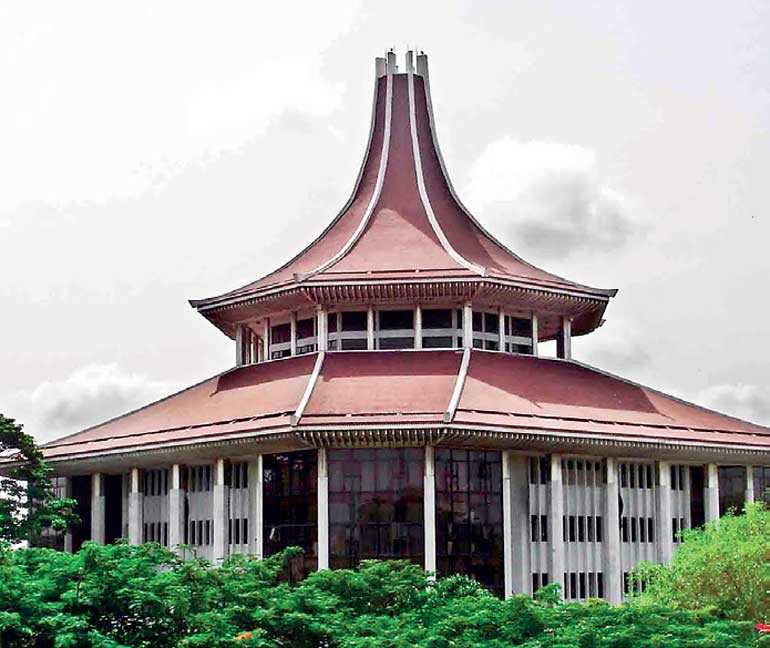Friday Feb 20, 2026
Friday Feb 20, 2026
Tuesday, 13 November 2018 01:04 - - {{hitsCtrl.values.hits}}

Civil society members, activists, and politicians alike sought the intervention of the Supreme Court as their last refuge yesterday, filing 11 fundamental rights petitions claiming President Maithripala Sirisena’s decision to dissolve Parliament was unconstitutional.
In an unprecedented move, one of the three members of the Election Commission, Dr. Ratnajeevan Hoole, was also among those who petitioned the three-member bench, claiming the move by Sirisena to dissolve Parliament was ex facie illegal, stating that he was duty bound to ensure the Constitution was honoured.
As the country’s political crisis entered yet another new phase, with Sirisena’s sudden move to dissolve Parliament days before his new Prime Minister was to show majority in the House, activists and politicians flocked to the Supreme Court as their last resort. The three-member bench, comprising of Chief Justice Nalin Perera and Justices Prasanna Jayawardane and Priyantha Jayawardane, listened to arguments listed out by petitioners in a courtroom packed to its capacity with lawyers, politicians, and journalists.
The sense of gravity was almost tangible when the Court decided to hear the cases filed just yesterday morning, taking into consideration the urgency of the matter, despite the Attorney General (AG) claiming that proper notice should be given to the Elections Commission. It was pointed out to the Court that one of the three members of the Elections Commission (EC), Dr. Hoole, was himself a petitioner in the matter, therefore the concern on notice was not valid.
AG Jayantha Jayasuriya’s request for more time until at least Wednesday was denied by the Bench, which directed him to submit his argument today at 10 am.
EC Member Dr Hoole, in his petition, sought to clarify the legality of dissolving the Parliament by the President. Dr. Hoole’s Attorney-at-Law Hijaz Hisbullah told Court that his client was “deeply conscious” of the need to maintain a degree of neutrality, due to the position he holds as a member of the Election Commission, but cited Justice Mark Fernando’s 1999 Supreme Court ruling in the Karunatillake Vs. Dayananda Dissanayake case, filed against the indefinite postponement of elections for five provincial councils in August 1998, which held that the Elections Commission should have obtained a judicial order in order to implement election laws.
Presenting his argument, Hisbullah noted that the proclamation that dissolves Parliament is ex facie illegal, as “there is only one article in the entire Constitution that allows for dissolution of Parliament by proclamation, and that is Article 70 (1).” The counsel noted that the President had avoided complying with that article when he dissolved Parliament.
The lawyer for the EC member said they were arguing “elementary matters of constitutional law”. “If Article 33 (2) can stand alone, when the President is being impeached, for violating the constitution or because he is mentally unfit - that he may still proceed to dissolve Parliament under 33 (2)?” Hisbullah asked. He also told the Court that honouring the election result was also as important as holding elections and allowing people to exercise their franchise. “At an election all people gather to express an opinion. If we allow the President to dissolve Parliament at any time, it says that the opinion of the President trumps all other opinions. There is one word for that, my lords – dictatorship.”
The counsel for the EC member also noted the urgency of granting interim relief to stay the election, saying the poll would be held at a great cost to the State. “The machinery has already started moving, and preliminary work to hold elections has begun,” he warned, saying the poll should be stayed until the Court concluded determining the matter.
The majority of the counsel presenting before the bench found fault with the President’s use of Article 33 (2), which has been done independent of Article 70 (1), which sets limits on his powers listed in the earlier Article 33 (2).
The proclamation by the President refers to Article 33 (2) of the Constitution, which gives him general powers to ‘summon, prorogue and dissolve Parliament’, but does not refer to the special provisions set out in the Constitution which set limits on his powers to do so.
Lawyers arguing noted that the provision in Article 33 (2) should be read with the provisions in Article 70, which sets out the framework within which the President’s powers to summon, prorogue and dissolve Parliament can be exercised.
“Article 33 says the President shall hold the Seal of the Republic – that doesn’t mean he can go and place the Seal anywhere he likes. There are special provisions listed in the Constitution setting out the instances in which the Seal may be used. A similar law of interpretation applies to the President’s power to dissolve Parliament,” K. Kanag-Iswaran PC argued for his petitioner, Opposition Leader R. Sampanthan.
M.A. Sumanthiran PC, counsel for petitioner Champika Fernando, also noted that if 70(1) is ignored in this manner, after a new Parliament sits - on January 17, according to the Gazette notification – then, on the very next day, i.e., January 18, Parliament could be dissolved. “What if the President doesn’t like the face of the next Prime Minister or something else? Can that be permitted?”
Attorney General Jayantha Jayasuriya, who was cited in the petitions as representing the President, whose actions were being challenged in all the cases filed yesterday, appealed for more time – at least until Wednesday – to make submissions, but was denied.